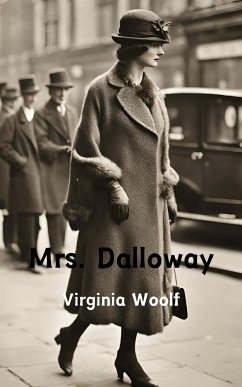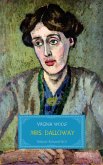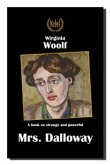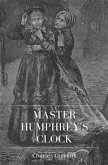"Mrs. Dalloway," a literary masterpiece by Virginia Woolf, is a captivating exploration of a single day in the life of Clarissa Dalloway, an elegant and sophisticated woman living in post-World War I London. Published in 1925, this novel is a tour de force of modernist literature, offering readers a profound and intimate glimpse into the intricacies of human thought, emotion, and society.
The novel unfolds over the course of a day as Clarissa prepares for an evening party she is hosting. However, this seemingly simple premise serves as a canvas for Woolf's groundbreaking narrative techniques. The story is not presented in a linear fashion but rather through a series of interconnected perspectives, capturing the inner lives of various characters. Woolf masterfully employs the stream-of-consciousness technique, allowing readers to delve into the minds of the characters and experience the ebb and flow of their thoughts in real-time.
At the heart of "Mrs. Dalloway" is Clarissa Dalloway herself, a character of depth and complexity. As she moves through the bustling streets of London, preparing for her soirée, readers witness the subtle nuances of her reflections on life, love, and the passage of time. Woolf's portrayal of Clarissa is both empathetic and incisive, as she navigates the societal expectations placed upon her and grapples with the choices she has made.
Woolf's depiction of London becomes a character in its own right, a vibrant and ever-changing backdrop that mirrors the flux of emotions experienced by the novel's protagonists. The city pulses with life, and as Clarissa moves through its streets, readers encounter a vivid tapestry of urban existence, from the bustling shops to the quiet corners where moments of introspection unfold.
The supporting cast of characters adds layers of richness to the narrative. Septimus Warren Smith, a shell-shocked veteran, provides a poignant counterpoint to Clarissa's reflections, highlighting the profound impact of war on the human psyche. The intersections of these diverse perspectives create a mosaic of experiences, revealing the interconnectedness of lives and the shared humanity that transcends individual struggles.
"Mrs. Dalloway" is not merely a novel; it is a symphony of words, a kaleidoscope of emotions, and a profound meditation on the human condition. Woolf's prose is lyrical and evocative, immersing readers in a sensory experience that transcends the boundaries of conventional storytelling. Each sentence is a brushstroke, contributing to the larger canvas of the novel's themes – the fleeting nature of time, the complexity of identity, and the delicate dance between the individual and society.
As readers accompany Clarissa on her journey, they become witnesses to the intricacies of existence, the beauty of fleeting moments, and the eternal quest for meaning. Woolf's narrative prowess invites readers to engage with the novel on a deeply personal level, prompting introspection and reflection on their own lives.
In the tapestry of literary achievements, "Mrs. Dalloway" stands as a testament to Virginia Woolf's genius. It is a novel that transcends its time, offering a timeless exploration of the human experience. To read "Mrs. Dalloway" is to embark on a transformative journey through the corridors of consciousness, where the ordinary becomes extraordinary, and the mundane is elevated to the sublime. This is a novel that lingers in the mind, inviting readers to revisit its pages and discover new layers of meaning with each encounter—a true literary classic that continues to resonate and captivate generations of readers.
The novel unfolds over the course of a day as Clarissa prepares for an evening party she is hosting. However, this seemingly simple premise serves as a canvas for Woolf's groundbreaking narrative techniques. The story is not presented in a linear fashion but rather through a series of interconnected perspectives, capturing the inner lives of various characters. Woolf masterfully employs the stream-of-consciousness technique, allowing readers to delve into the minds of the characters and experience the ebb and flow of their thoughts in real-time.
At the heart of "Mrs. Dalloway" is Clarissa Dalloway herself, a character of depth and complexity. As she moves through the bustling streets of London, preparing for her soirée, readers witness the subtle nuances of her reflections on life, love, and the passage of time. Woolf's portrayal of Clarissa is both empathetic and incisive, as she navigates the societal expectations placed upon her and grapples with the choices she has made.
Woolf's depiction of London becomes a character in its own right, a vibrant and ever-changing backdrop that mirrors the flux of emotions experienced by the novel's protagonists. The city pulses with life, and as Clarissa moves through its streets, readers encounter a vivid tapestry of urban existence, from the bustling shops to the quiet corners where moments of introspection unfold.
The supporting cast of characters adds layers of richness to the narrative. Septimus Warren Smith, a shell-shocked veteran, provides a poignant counterpoint to Clarissa's reflections, highlighting the profound impact of war on the human psyche. The intersections of these diverse perspectives create a mosaic of experiences, revealing the interconnectedness of lives and the shared humanity that transcends individual struggles.
"Mrs. Dalloway" is not merely a novel; it is a symphony of words, a kaleidoscope of emotions, and a profound meditation on the human condition. Woolf's prose is lyrical and evocative, immersing readers in a sensory experience that transcends the boundaries of conventional storytelling. Each sentence is a brushstroke, contributing to the larger canvas of the novel's themes – the fleeting nature of time, the complexity of identity, and the delicate dance between the individual and society.
As readers accompany Clarissa on her journey, they become witnesses to the intricacies of existence, the beauty of fleeting moments, and the eternal quest for meaning. Woolf's narrative prowess invites readers to engage with the novel on a deeply personal level, prompting introspection and reflection on their own lives.
In the tapestry of literary achievements, "Mrs. Dalloway" stands as a testament to Virginia Woolf's genius. It is a novel that transcends its time, offering a timeless exploration of the human experience. To read "Mrs. Dalloway" is to embark on a transformative journey through the corridors of consciousness, where the ordinary becomes extraordinary, and the mundane is elevated to the sublime. This is a novel that lingers in the mind, inviting readers to revisit its pages and discover new layers of meaning with each encounter—a true literary classic that continues to resonate and captivate generations of readers.









